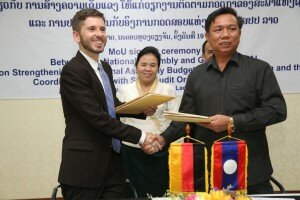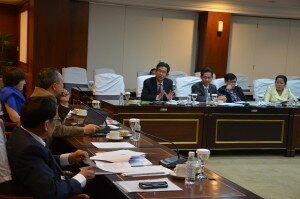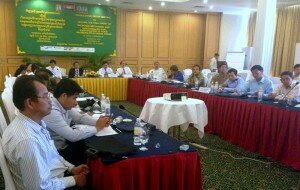GIZ-ASEANSAI goes Parliament: Cooperation Agreement with National Assembly of Lao PDR

Daniel Blessing, GIZ Advisor to the ASEANSAI project, and Mr. Khampoun Phengthirath, Deputy Director General, Department of Planning and Finance, National Assembly of Lao PDR, exchange the signed cooperation agreement in Vientiane, Lao PDR
07 April 2015
A Supreme Audit Institution is a crucial institution in a state’s public finance system. They monitor how public money is spent according to rules and laws and whether the amount of money spent on certain issues is reasonable. With their annual reports, Supreme Audit Institutions provide valuable information to government, to parliament and civil society.
Established in 1998, Lao PDR’s Supreme Audit Institution is still relatively young among the other nine ASEAN member states. More>>>
GIZ-ASEANSAI goes Parliament: Cooperation Agreement with National Assembly of Lao PDR

Daniel Blessing, GIZ Advisor to the ASEANSAI project, and Mr. Khampoun Phengthirath, Deputy Director General, Department of Planning and Finance, National Assembly of Lao PDR, exchange the signed cooperation agreement in Vientiane, Lao PDR
07 April 2015
A Supreme Audit Institution is a crucial institution in a state’s public finance system. They monitor how public money is spent according to rules and laws and whether the amount of money spent on certain issues is reasonable. With their annual reports, Supreme Audit Institutions provide valuable information to government, to parliament and civil society.
Established in 1998, Lao PDR’s Supreme Audit Institution is still relatively young among the other nine ASEAN member states.
“One could say it’s still a teenager: It already knows a lot, but there is still some time to develop”, said Daniel Blessing, GIZ-Advisor in the ASEANSAI project.
GIZ’s ASEANSAI project currently supports the Audit Office of Lao PDR and the Parliament of Lao PDR in improving its cooperation. Yesterday, the ASEANSAI project and the National Assembly of Lao PDR signed an agreement to forge a closer cooperation. This is the first time that the GIZ ASEANSAI project has signed a formal cooperation agreement with a parliament in the region.
“Lao PDR is a good pilot case. The Parliament is very active and the German Embassy in the country is very supportive,” explained Daniel Blessing.
The objective of the ASEANSAI project support is to improve cooperation between the National Assembly and the Supreme Audit Institution of Lao PDR, and develop a better understanding of their different roles. In the long-run the goal is to build political support for an independent Supreme Audit Institution.
However, Supreme Audit Institutions can only work effectively if it has a good cooperation with parliament. “Such institutions need strong partners. Parliament, or budget committees are their natural partners,” continued Blessing.
In Southeast Asia, GIZ is implementing regional cooperation projects, which work with ASEAN countries. The regional project, Support to ASEAN Supreme Audit Institutions (GIZ-ASEANSAI), holds its main office in Phnom Penh, but it is working with all Supreme Audit Institutions in the region, especially with the Supreme Audit Institutions of Cambodia, Lao PDR, Myanmar and Vietnam.
“Lao PDR is a country with a limited budget. It is even more important to spend each Kip in a way that supports poverty alleviation and overall national goals,” said Ernst Hustädt, Country Director of GIZ Lao PDR.
Contact Persons:
Project Leader: Mr. Alexander Beetz,
CLMV-Activities: Mr. Daniel Blessing,
![]()
Learning from Indonesia’s Experiences to inform Cambodia’s Sub-National Democratic Development (SNDD) Reform

Delegation from Cambodia exchanges experiences on the structure and management of civil service with the Indonesian Ministry of Bureaucracy Reform.
March 2015
Jakarta, Indonesia––With the wish to learn from the Indonesia’s practical decentralisation experiences, a Cambodian delegation visited Jakarta and West Java Province in March 2015. The delegation was led by H.E. Sak Setha, Secretary of State of the Ministry of Interior, and was interested in various topics that would contribute to their sub-national democratic development reform in Cambodia, including:
- Organization and management of Indonesia’s civil service;
- Personnel management and development practices of Indonesia’s local governments; and
- Assignment of functions, responsibilities and resources to Indonesia’s central and local government tiers. More>>>
Learning from Indonesia’s Experiences to inform Cambodia’s Sub-National Democratic Development (SNDD) Reform

Delegation from Cambodia exchanges experiences on the structure and management of civil service with the Indonesian Ministry of Bureaucracy Reform.
March 2015
Jakarta, Indonesia––With the wish to learn from the Indonesia’s practical decentralisation experiences, a Cambodian delegation visited Jakarta and West Java Province in March 2015. The delegation was led by H.E. Sak Setha, Secretary of State of the Ministry of Interior, and was interested in various topics that would contribute to their sub-national democratic development reform in Cambodia, including:
- Organization and management of Indonesia’s civil service;
- Personnel management and development practices of Indonesia’s local governments; and
- Assignment of functions, responsibilities and resources to Indonesia’s central and local government tiers.
The Royal Government of Cambodia has declared the decentralization of key functions, responsibilities and public services from ministries to elected sub-national councils a priority in the present phase of SNDD reform (2015-2017), with the objective to bring public services and decision-making closer to citizens.
With decentralization, it is expected that citizens be able to more easily voice their needs and expectations to local councils and to hold local decision-makers and service providers accountable for their actions. For sub-national councils and service providers, it will be easier to listen to citizens’ voices and to be informed about their needs and demands.
The ministries of health and education, among others, are reviewing their responsibilities in order to identify the functions, which can be decentralised. For councils to be able to perform these functions, they will also receive the necessary financial and personnel resources from central government.
In order to transfer ministry personnel to sub-national council administrations, the Ministry of Civil Service, in cooperation with the Ministry of Interior and NCDD-S, is presently developing a Royal Decree clarifying the status of civil servants of sub-national council administrations with Cambodia’s civil service structure.
It is against the background of these Cambodian decentralisation reform efforts that the NCDD Secretariat, in cooperation with the GIZ-implemented EU Programme for Strengthening Performance, Accountability and Civic Engagement (EU SPACE) in Cambodia, and the Programme Transforming Administration – Strengthening Innovation (TRANSFORMASI) in Indonesia, facilitated the study visit to Indonesia.
In Indonesia, the Cambodian delegates had the opportunity to exchange with representatives of the TRANSFORMASI counterparts, including:
- Ministry of Finance
- Ministry of State Apparatus and Bureaucracy Reform (KemPAN)
- National Institute of Public Administration (LAN)
- National Civil Service Agency (BKN)
as well as with
- the Ministries of Health and Culture, Primary and Secondary Education,
- Regional Government of West Java and
- Regency Government of Depok City.
Members of the Cambodian delegation included representatives of the Ministries of Civil Service; Interior; Health; Education, Youth and Sport; Economy and Finance as well as of the Secretariat of the National Committee for Sub-National Democratic Development (NCDD-S), the Association of Capital and Provinces and the National League of Local Councils.
![]()
Targeting Urban Poverty: IDPoor to expand to Cities
Cambodians, both rich and poor, are moving to the cities. One-in-five call a town or city their home and the urban population growth rate is double that of rural areas (UN data, 2010-15). Social services need to keep up with the population and reach the poor in urban areas just as well as in the countryside.
The IDPoor Programme of the Cambodian Ministry of Planning identifies poor households so that they can access targeted services to help improve their livelihoods. More>>>


